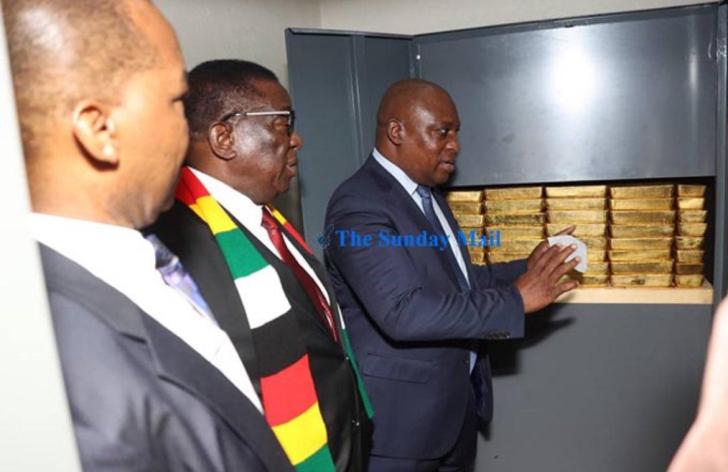News / National
Zimbabwe foreign currency reserves rise to US$500m
10 Nov 2024 at 10:41hrs | Views

Zimbabwe's foreign currency reserves backing its local currency, the Zimbabwe Gold (ZiG), have surged past US$500 million, tripling the total amount of ZiG in circulation. This development is expected to foster greater currency stability and help stabilize prices, strengthening the purchasing power of consumers.
The ZiG has appreciated significantly over the past few weeks, climbing from an exchange rate of US$1.40 at the end of October to US$1.60 by last Friday. The recent appreciation suggests reduced pressure on Zimbabwe's formal foreign exchange market, with the currency's improved performance largely attributed to the Reserve Bank of Zimbabwe's (RBZ) monetary policy measures.
As of early November, the RBZ reported foreign currency reserves at approximately US$509 million, surpassing domestic bank deposits in ZiG, which stand at around ZiG12 billion. RBZ Governor Dr. John Mushayavanhu noted that this foreign reserve surplus reflects recent RBZ initiatives aimed at curbing exchange rate fluctuations and inflation.
"The combined effect of these measures has significantly reduced ZiG liquidity in the market," said Dr. Mushayavanhu. "The exchange rate has also strengthened, benefitting from increased foreign currency receipts."
Zimbabwe's foreign currency inflows increased by 18 percent during the first nine months of 2024 compared to the same period in the previous year, bolstering the ZiG's appreciation under the willing-buyer, willing-seller arrangement. The strengthening of ZiG, he added, aligns with foreign currency supply and demand dynamics on the interbank market.
To support local currency stability, the RBZ raised its bank policy rate from 20 percent to 35 percent and adjusted statutory reserve requirements. The reserve requirement for demand and call deposits in both local and foreign currencies was set at 30 percent, with savings and time deposits at 15 percent.
Increased demand for ZiG is also being driven by tight liquidity conditions. "The tight ZiG liquidity conditions amid a tight monetary policy stance in the market have seen increased willingness by economic agents to liquidate their foreign currency positions, thereby creating demand for ZiG," Dr. Mushayavanhu explained.
He highlighted that Zimbabwe's total reserve money in local currency currently amounts to around ZiG3.4 billion (approximately US$129 million), meaning that the RBZ's foreign currency reserves are more than three times the local currency reserve money.
"Currently, the Reserve Bank reserves have topped US$500 million, which implies more than three times the cover of reserve money," he said.
To maintain foreign exchange stability, the RBZ will continue to intervene in the market, utilizing half of the mandatory 25 percent export surrender requirements to ensure steady foreign exchange market operations. These interventions are designed to meet legitimate foreign payment demands and support the stability of the ZiG currency.
"The full backing of the local currency reserve money ensures that at each point the Reserve Bank has adequate foreign currency reserves to intervene in the market," said Dr. Mushayavanhu. The Reserve Bank, he added, is committed to strategic foreign currency interventions to ensure a stable environment for Zimbabwe's domestic currency and foreign payment settlements.
The ZiG has appreciated significantly over the past few weeks, climbing from an exchange rate of US$1.40 at the end of October to US$1.60 by last Friday. The recent appreciation suggests reduced pressure on Zimbabwe's formal foreign exchange market, with the currency's improved performance largely attributed to the Reserve Bank of Zimbabwe's (RBZ) monetary policy measures.
As of early November, the RBZ reported foreign currency reserves at approximately US$509 million, surpassing domestic bank deposits in ZiG, which stand at around ZiG12 billion. RBZ Governor Dr. John Mushayavanhu noted that this foreign reserve surplus reflects recent RBZ initiatives aimed at curbing exchange rate fluctuations and inflation.
"The combined effect of these measures has significantly reduced ZiG liquidity in the market," said Dr. Mushayavanhu. "The exchange rate has also strengthened, benefitting from increased foreign currency receipts."
Zimbabwe's foreign currency inflows increased by 18 percent during the first nine months of 2024 compared to the same period in the previous year, bolstering the ZiG's appreciation under the willing-buyer, willing-seller arrangement. The strengthening of ZiG, he added, aligns with foreign currency supply and demand dynamics on the interbank market.
Increased demand for ZiG is also being driven by tight liquidity conditions. "The tight ZiG liquidity conditions amid a tight monetary policy stance in the market have seen increased willingness by economic agents to liquidate their foreign currency positions, thereby creating demand for ZiG," Dr. Mushayavanhu explained.
He highlighted that Zimbabwe's total reserve money in local currency currently amounts to around ZiG3.4 billion (approximately US$129 million), meaning that the RBZ's foreign currency reserves are more than three times the local currency reserve money.
"Currently, the Reserve Bank reserves have topped US$500 million, which implies more than three times the cover of reserve money," he said.
To maintain foreign exchange stability, the RBZ will continue to intervene in the market, utilizing half of the mandatory 25 percent export surrender requirements to ensure steady foreign exchange market operations. These interventions are designed to meet legitimate foreign payment demands and support the stability of the ZiG currency.
"The full backing of the local currency reserve money ensures that at each point the Reserve Bank has adequate foreign currency reserves to intervene in the market," said Dr. Mushayavanhu. The Reserve Bank, he added, is committed to strategic foreign currency interventions to ensure a stable environment for Zimbabwe's domestic currency and foreign payment settlements.
Source - sundaymail









































